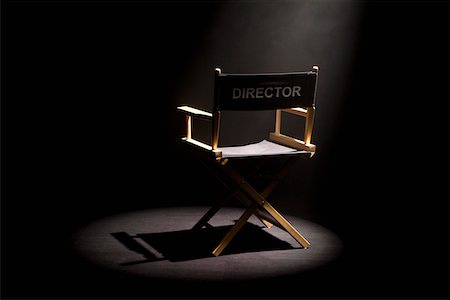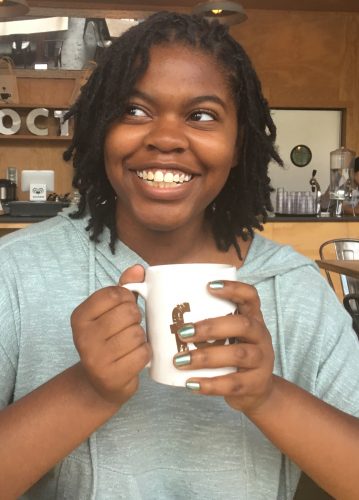
In the Director’s Chair
As a producer, I spend a lot of time working with directors but that doesn’t mean I totally understand them or their thought processes. So I asked my friend and collaborator, Kayla Harris, who is a second year Director at Columbia, some questions to learn some more about the pressures of the director’s chair.

Where Kayla sits. © Masterfile Royalty-Free
EO: So, I know I’ve talked a bit about how feedback impacts me as a producer; can you tell me how feedback from professors, and then from students, impacts you as a director?
KH: Feedback is one of those things that will always feel nerve-wracking. Do they like my dialogue? Did they notice the gaping plot hole I tried to hide? Did the dolly shot work like I wanted it to? It’s easy to get a pat on the back and feel good about what you did, and it’s important to hear what’s working well in your work. The most valuable feedback to me, however, is the feedback that makes you say, “Ouch. Is it really that bad?” There’s been many times during in-class critiques and faculty critiques where I felt a little stung. But you have to learn how to get to the root of the critique and see what people are actually trying to tell you. That will help you learn creative problem solving and come out with a better final product.
EO: What’s the best feedback you’ve ever received? And why do you consider it to be the best?
KH: For me, feedback that’s posed as a question is most helpful to me. For example, “Why does your protagonist make this choice?” is more helpful to me than “What she’s doing doesn’t make sense.” Posing feedback in a question instead of a statement inspires inquiry and an exploration of your artistic choices.
EO: What have you found you were you most prepared for in the program?
KH: I got a bachelor’s degree in film, so I had already been on some film sets and knew a lot of the basics of that. I also already knew a lot of other fundamentals, so I felt pretty prepared in that regard.
EO: What were you least prepared for?
KH: Honestly, I was the least prepared for being constantly creative. Throughout the program, especially in the first year, you’re pushed to be constantly working on things. You’re asked to push out scripts, treatments, loglines, paperwork every week, multiple times a week, which sounds crazy. Probably because it is. But strangely enough, it works. You come up with things you never thought you could because you’re always looking for the next story you want to tell. Don’t get me wrong, not everything you make is going to be great. Some of it won’t even be good, which is a hard truth to learn. But when you’re always looking for artistry, sometimes you strike gold. And that’s a pretty good feeling when you get there.

The director herself.
EO: What’s the most important thing you’ve learned that’s helped make you a better director?
KH: The most helpful thing I’ve learned is to always ask yourself, “Does this serve the story?” That’s our job as directors before anything else, I think. We are advocates for our narratives and should always try to do right by our creations. Sometimes, that means being assertive and getting people on the same page as you. Other times, that means stepping back and realizing you’ve lost your vision along the way and you need to reconsider your game plan. But it’s probably the most important thing you’ll learn and will always help you guide your choices as a filmmaker.
EO: What’s been the least helpful?
KH: Sometimes I think we all get too stuck in trying to tell these big, sweeping, meaningful stories. That’s definitely important and valuable; but sometimes you want to make something silly and fun just because you can or you want to tell a story that doesn’t follow traditional story conventions and there is a hesitance towards that kind of stuff that can be discouraging at times.
EO: What would be your biggest piece of advice to an incoming student someone thinking of applying to the program?
KH: I have three pieces of advice!
- Creativity is everywhere, so take in as much as you can. Be constantly taking in new media. Get on other people’s sets. Network where you can. When you’re learning from other people, it greatly helps your own creative process.
- Take care of yourself. Seriously. It’s hard to be creative and blossom if you’re not feeling your best. So do as much as you can, but don’t be afraid to say no and take a nap. Eat your veggies. Do what you gotta do to keep yourself sane.
- Filmmaking is hard, there’s no doubt about that. But it’s also as fun as you want it to be. Tell your stories and have the time of your life doing it! You’ve got this.
This interview was edited for brevity.
